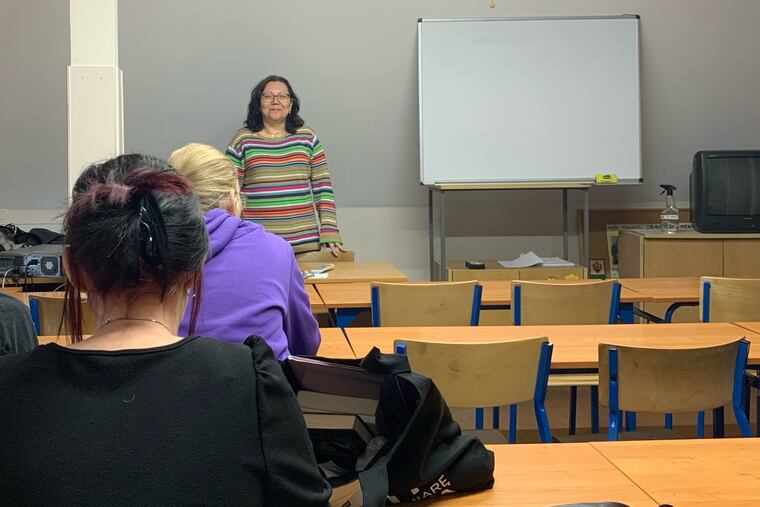How the mother of a Drexel athlete is housing and teaching kids of Ukrainian refugees in Poland
Rosanna Radlinska-Tyma has the mindset of "If I'm not going to act then who is?" She's doing plenty, as her daughter, a squash player at Drexel, worries about her family and her homeland.

Rosanna Radlinska-Tyma and her family returned to Poland in 2020 after spending about 13 years in the United Kingdom. They had dreams of building their long-term future in the city of Gorzow.
But on Feb. 24, war broke out when Russia invaded Poland’s neighbor and ally, Ukraine.
Poland has become a temporary home to more than 2.8 million Ukrainians seeking refuge. Radlinska-Tyma is one of many Poles who have opened their homes to those leaving Ukraine.
» READ MORE: Still in Kyiv, family of Drexel’s Alina Bushma trying to help defense of Ukraine however they can
“I think we all understand that it is vital to help people, but also many Poles are scared,” Radlinska-Tyma said. “The war is just on our doorstep. Some areas were shelled in Lviv (a Ukrainian city approximately 45 miles from the Polish border).
“I feel that the Poles have got together, and we feel more united than ever before.”
Her daughter, Karina Tyma, who is a junior squash player at Drexel, said her mom has always tried to help her community. When the family lived in Bristol, England, Radlinska-Tyma ran a Polish Saturday school, providing an atmosphere for the Polish residents of the area to share their language and culture in a safe space.
While her surroundings may look different today in Gorzow, her care for the community remains the same.
“My mom has always been very much involved in the community,” Tyma said. “She realizes how crazy the situation with Ukraine and Russia is, and I just can’t believe it sometimes. She has the mindset of ‘If I’m not going to act, then who is?’”
Radlinska-Tyma is hosting her third family in almost two months. Her current family has been staying with her since March 15.
The family includes a mother with her 12- and 17-year-old sons. The boys try to continue daily life as usual, attending Ukrainian classes through Zoom and taking saxophone lessons at the local music school while their father stays behind in Ukraine.
“Luckily, their father is not fighting. He is working, but all men can be conscripted any time, and they can’t leave the country,” Radlinska-Tyma said. “It is difficult to support the family emotionally as they cannot plan anything, really. If they decided to stay in Poland, it would be easier, but they want to go back.
“Ultimately, it means you cannot plan your future, or at least long-term future. They live day by day.”
That includes a much different setup than what they may have been accustomed to at home in Ukraine. They share a bedroom with a bed for Radlinska-Tyma and another for the boys to share. Their new classroom consists of Karina Tyma’s old desk to attend Zoom classes. The kitchen and garden are shared with Radlinska-Tyma. And the new living area is set for them to gather and study the Polish language.
Radlinska-Tyma has taught English over the past few years in secondary school, essentially what Americans would know as high school. Fluent in English, Polish and Russian, she often goes back and forth between languages when teaching lessons for Ukrainian and Polish students.
Her time teaching English at St. Brendan’s Sixth Form College in Bristol has helped with the students’ transition to the new program. Here she taught plenty of international students, some of whom had fled from war in Somalia.
» READ MORE: Drexel swimmer and Ukraine native: ‘Afraid to think of what could come next’ with Russia
“I feel that they are happy to have someone who speaks Russian, so they can turn to me if there are any problems,” Radlinska-Tyma said. “The Ukrainian and Russian languages are from the group of Slavic languages as is Polish, so I hope that students will pick up Polish quickly.”
Gorzow is trying its best to communicate the needs of Ukrainians to its residents. The city council, with help from its Ukrainian community, opened a reception point for the refugees.
“I must say I am absolutely proud of Polish people who rushed to help,” Radlinska-Tyma said. “It was all people’s initiative. People have organized the transport for Ukrainians, and for their pets as well, accommodation and food. The reception points at the border were organized well — hot drinks, meals, blankets, clothes, food.
» READ MORE: The U.S. promises more aid for Ukraine as Antony Blinken and Lloyd Austin visit Kyiv
“I have a space at home where people can stay and be safe. No one should be forced to leave their house with a small bag only. I speak fluent Russian, so I thought that it could be something that would not add to their distress.”
While Radlinska-Tyma and other Poles are trying to help any way they can, there still are fears for their own future.
“Recently a lot has happened, and if this continues, it will probably spread and Poland could be another target in the way,” Tyma said. “It makes me anxious about a lot of things. I feel guilty that I can’t do anything.
“I can, but not in the way that my family can. They can impact people directly. My parents also moved back to Poland not too long ago, so this is their future we’re worried about too.”
» READ MORE: Russia hits rail and fuel targets far from the eastern front